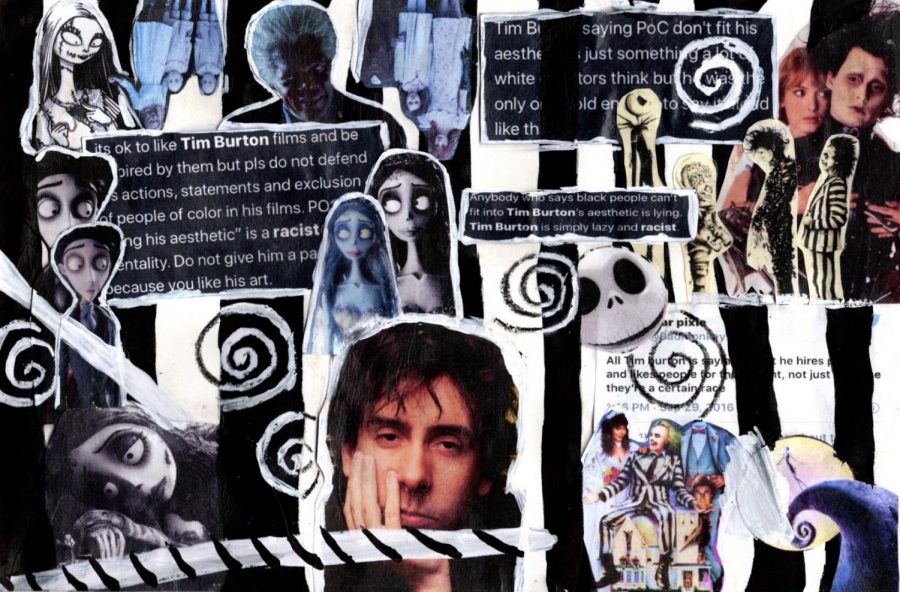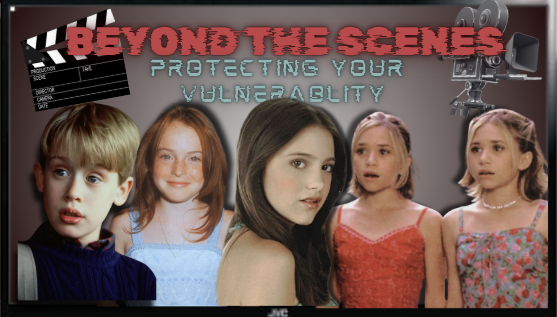Tim Burton: Imaginative Until it Comes to Race
When thinking of the avidly successful director, producer, and filmmaker Tim Burton, one might at first associate him with his generally outlandish, grim, and macabre fairy tales. He is responsible for majorly successful films such as Corpse Bride, Nightmare Before Christmas, Edward Scissorhands, and BeetleJuice. Not very typically do we tag him with the label “racist,” but lately, this word has been surfacing more often in regards to Burton.
Upon the production of his 2016 film Miss Peregrine’s Home for Peculiar Children, his casting choices, past and present, were severely scrutinized. This particular movie was the first of his that casted a Black actor, Samuel L. Jackson, and the whiteness of his previous casts became more glaring. Twitter users were quick to bicker back and forth, some claiming that Burton was not racist, but instead adhering to an aesthetic without taking race into account. Others claimed that, because it had taken this long for Burton to cast a person of color, his favoritism toward casting white actors should be regarded critically.
Because diversity has been such a relevant topic of interest in recent years, Tim Burton made the following statement:
“I remember back when I was a child watching ‘The Brady Bunch,’ and they started to get all politically correct, like, ‘OK, let’s have an Asian child and a black’— I used to get more offended by [seemingly forced representation] … I grew up watching blaxploitation movies, right? And I said, ‘that’s great.’ I didn’t go like, ‘OK, there should be more white people in these movies.’”
According to the Washington Post, Burton further expressed his views to editor Rachel Simon that “things either call for things, or they don’t.”
From September to November of 2020, Tim Burton’s comments about race were circulating Twitter. Most of the discourse surrounding his statement was negative, but a few loyal fans were dismissive of the criticism.
Twitter user, @underrateddijsoo, was direct and succinct in their opinion, sharing, “anybody who says black people can’t fit into Tim Burton’s aesthetic is lying. Tim Burton is simply lazy and racist.”
A significant amount of Tweets very similar to this one flooded the Twitter timeline around Halloween. However, some users took offense to these claims, viewing them as drastic and offensive.
@BadMonkeysClub had this to say about Burton’s scandal: “All Tim burton is saying is that he hires people and likes people for their talent, not just because they’re a certain race.” While this user was not the only one to share a thought in defense of the famed director, it seems that this opinion was still in the minority.
However, Samuel L. Jackson himself spoke about his experience working with Tim Burton saying that while he “may have been the first [black character in a Tim Burton movie]… it happens the way it happens.” He does not think that it is Burton’s fault, referring to him as “a really great guy.”
One Twitter user, @olivewoodsy, stated, “it’s ok to like Tim Burton films and be inspired by them, but please do not defend his actions, statements, and exclusion of people of color in his films. POC ‘not fitting his aesthetic’ is a racist mentality. Do not give him a pass just because you like his art.”
There were other discussions surrounding the fact that, while Tim Burton’s actions are not okay and his statement was somewhat lousy, he is not the only one in Hollywood holding people of color back. @camerouninema said, “Tim Burton saying PoC don’t fit his aesthetic is just something a lot of white directors think, but he was the only one bold enough to say it aloud like that.”
Fans of Burton seem to be generally disappointed, some even swearing off their traditions of watching his movies around Halloween and Christmastime. The issue at hand does not seem, at the moment, as if it will be taken lightly, and Burton’s casting decisions will not be forgotten about anytime soon.
Loyal fan, Daksha Pillai, wrote an opinionated article, compiling their thoughts into a beautifully worded piece of work. They described Burton as “the creative genius who ruled much of [their] childhood imagination with his gothic whimsy,” but they started to find disappointment in him due to a lack of diversity in his films. At first, it was not obvious to them until they finally thought about it and found “that there was an appalling lack of diversity in some of the movies that had shaped [their] childhood. Worse than that, it seemed like their creator didn’t really care.” This was the final straw before they spoke out, wanting “him and others who don’t get what the fuss is all about to understand why diversity in all avenues is important, how media can affect the people who consume it, and how unconventional people can still have conventional biases.”
They go on to mention that, when people of color are represented in any way, they are often depicted as monstrous and evil, always a supporting character, never a lead. This was true for Samuel L. Jackson’s role in Miss Peregrine’s Home for Peculiar Children, and it is true for many other movies. Pillai condemned Burton’s attempt at an excuse, saying, quite poignantly, “you don’t want to have minority characters simply because they are minorities; that’s known as tokenism, and the characters as a result end up boring and one-dimensional. But, people of color shouldn’t have to be called for in order for their stories to be told.” Directors choose who to cast, and Tim Burton tends to choose white people.
His movies often depict stories of societal outcasts, and fans are questioning why minority groups are being excluded from his films if he is so adamant about exhibiting the atypical or the underrepresented. The general public opinion seems to be that Tim Burton, along with countless other directors, need to do a better job with representation in their movies. People are tired of excuses and awkward justifications for a lack of representation in this day and age, and after this backlash toward Burton, movie-watchers can only wait and see if he takes these expressed qualms to heart in future films.
Your donation will support the student journalists of Huntington Beach High School. Your contribution will allow us to cover our annual website hosting costs.
Thank you for supporting our program!







